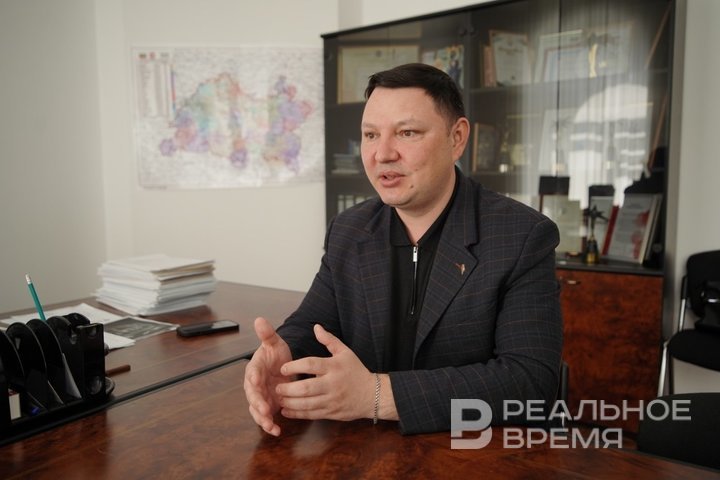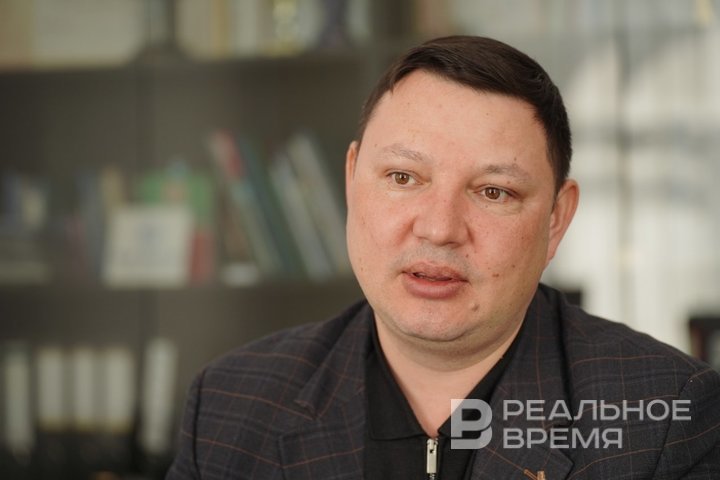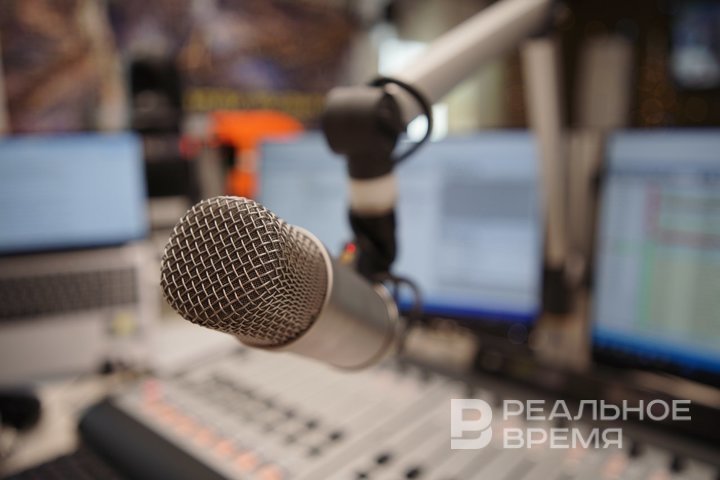Ilfar Karimov: ‘Ethnofolk is very popular now not only here, but also abroad’
Executive Director of Bolgar Radiosy — about the reasons for the success of Homay, the station's projects and the problems of regional radio

“We've been trying to rejuvenate our audience, and we're slowly succeeding — more listeners aged 30 to 35 are calling in," said the management of Bolgar Radiosy. The station’s renewed focus on younger demographics has reshaped its programming and playlists over the past few months. Ahead lies a live listener meet-up for Radio Day, which promises to be a major celebration. Executive Director Ilfar Karimov spoke to Realnoe Vremya about the upcoming festivities, new music projects, and the future of Tatar national radio.
Radio Day Celebration
Mr Karimov, you are going to have a professional holiday soon — Radio Day on May 7. How are you preparing for it?
Every year, by this date, we organise different events — it's either an on-air campaign or some kind of field trip. Earlier, on Radio Day, we used to hold a concert for our listeners in the Staro-Tatarskaya Sloboda of Kazan, organised various contests on the air. This year we decided to take a swing at Tatneft Arena and make a bigger event, as our concerts are popular.
We are holding our main concert at the end of the year, which is the presentation of the National Music Award Bolgar Radiosy. Tickets for it are sold out in a few months. Therefore, we decided that in May we would arrange a big celebration for our audience, where everyone could get in. The hall of the ice arena can accommodate 7-8 thousand spectators, I think we will gather them, because there are a lot of people who want to come. After all, this is the largest hall in Kazan, and Bolgar Radiosy, I believe, has already grown to such a level, and our radio listeners deserve to be at the Tatar song festival. Many major radio stations do shows in big arenas, and we also want to give this gift to the audience.
Since it's Radio Day, we want all the presenters of our radio station to be there. The format of the concert will be non-standard, in between performances of the artists we will hold interactive games and practical jokes. We are currently playing off an Ak Bars jersey on social media with autographs of the performers who will be at this concert. And on the day of the show, we will give away autographed jerseys from the hockey team itself, as we are currently in the playoffs. Of course, we support Ak Bars, but it may happen that the game will fall on May 7 if our hockey players reach the finals. Then we'll have to reschedule our concert for another day, but the venue will remain the same. Therefore, we hope that Ak Bars will win, but they will not play on this day (laughs).
Homay took off thanks to the national flavour
Do you feature only Tatar artists on your station, or do you also play music by other ethnic performers? Right now, the song Homay by the Bashkir folk group Ay Yola is climbing the global charts. What are your impressions of the track — will you be adding it to your radio rotation?
We are a more traditional Tatar radio, you can hear almost all the songs of Tatar performers on our air. But Homay is a Bashkir song, albeit a popular one. I think it's not our format after all. Although the video with the song is gaining a lot of views, not only among Bashkirs and Tatars, but also among the Russian-speaking and English-speaking populations. The song has attracted a lot of attention and will continue to be popular for a while, but I think by the end this song will have been forgotten.

Could Tatar performers perhaps draw inspiration from the success of their Bashkir colleagues? After all, they have proven that ethnic music — including Turkic-language songs — can be fashionable and appealing to audiences around the globe.
Of course, because if you figure out what the popularity of this song is? I also watched various videos of this group and realised that, after all, music with elements of folklore, or ethnofolk, is very popular now — it's fashionable not only here, in the Tatar stage, but also in Russia and abroad as a whole. Homay was shot thanks to the national flavor, the musicians used elements of national music, national instruments. It sounds very interesting and fresh, so they attracted attention.
“We try to study what Tatar youth like, what they listen to on the Internet”
Earlier you said that you intend to become closer to the youth audience. What has changed in these months?
We are working hard in this direction. We set a goal, we tried to rejuvenate the audience and are slowly achieving this, judging by the feedback from listeners. We analysed the calls on the air and found out that we get more calls from people aged 30-35 years. We can also see from the messages that our audience has rejuvenated, of course, this is reflected in the selection of songs, in the headings.

We primarily aim to perform all the popular Tatar songs and collaborate with well-known Tatar artists. Recently, we've even started featuring songs performed by artificial intelligence — this is the group Yözsez Voices. The lyrics were written by young people, while the music and vocal parts were composed and performed by AI. The singer — a female voice singing in Tatar — delivers a remarkably clear performance. It all sounds quite fresh and intriguing.
But our radio listeners are still more used to other music. Tatar bandstand is the main thing for our radio station. Although we also try to study and analyse the audience — what Tatar youth like, what they are currently listening to on the Internet, and what songs they share. Based on this, we try to select the playlist in such a way as to reach more young listeners.
The Internet and TV only help radio develop
How is the upgrade of the station's logistics base progressing?
At the end of last year, we updated our studio, we have video cameras that provide high-quality shooting in Full HD format. Now you can not only listen to the radio, but also watch it all day long. To do this, go to the official website of the station, where there are two buttons “Listen to the radio” and “Watch the radio”. If you want to see what the presenter looks like or which guest came to the studio, you can easily do it now.
Moreover, all of our programmes are recorded and made available as video versions the very next day. These video podcasts are published on our social media platforms and are also popular with our audience, as not everyone can tune in to their favourite show live. Some are working at that time, while others may be resting. For example, the programme Sekhnedesh airs at 10:00 PM, when some listeners are already asleep — but they can easily visit our social media the following day and catch up with the recording.

After we updated the studio and got a visualisation of the content, the number of visitors to the site also increased. Previously, traffic was about 1,500-2,000 people per day, but now the average number is 4,000. We also have a large community on the VKontakte network, today we are one of the Tatarstan radio stations with the largest number of subscribers — about 70,000, and the audience of social networks is growing every day. Accordingly, the number of views and listening to programs in online format are the same.
Currently, the Internet is very well developed in Tatarstan, and almost all villages have it. Therefore, even in places where there are no FM waves, our radio listeners can listen to us through smart speakers, meaning we can be found everywhere. Digitalisation is doing its job, radio is only expanding and is not disappearing anywhere. When the Internet or television appeared, everyone said that the age of radio had passed. It turned out, on the contrary, they only help us to develop.
“As a Tatar-speaking station, it is more difficult for us to find staff”
A recent study showed that Kazan residents listen to the radio in the car more than residents of other Russian cities. Do you take this into account in your work?
Naturally, people listen to the radio in the car, mostly when they go to or return from work. This is prime time — from 7 a.m. to 9 a.m., and in the evening from 5 p.m. to 7 p.m. Therefore, every weekday morning begins with our “steam train” — the morning show Irtenge Chei. This is up-to-date information for the current day, sports, cultural news, that is, the news that a person can discuss with colleagues over a cup of coffee. We give you the weather forecast, how to dress — that is, light useful information. In addition, at the beginning of every hour we have news releases, where more serious events from the life of the country are covered.
In the evening, when a person returns from work, we have music playing non-stop, because people are tired and want to relax. During this period of time, we include songs they know, hits that they love and listen to.
If we talk about regional radio in general, what are the main concerns?
I think that the main problem in the industry today is the shortage of personnel. My generation was listens to the radio, I was interested in it, but today's generation of young people is interested in something else, they hang out on the Internet more, watch reels. Radio seems to them like something from the past. But all the same, when they grow up, by the age of 30, they nevertheless become radio listeners.
Nowadays, it was easier to find presenters among young people, but now there are few young people interested in promoting radio. Although our university produces journalists, there are not enough radio journalists and radio presenters. Plus, as a Tatar-speaking station, it is even more difficult for us to find staff. It is necessary for a person to know the literary Tatar language, speak it clearly, so that he has a well-defined speech and good diction, that is, the task becomes much more complicated.
But in general, regional radio stations are also developing and finding their listeners. You can't just focus on broadcasting. We need to organise big events, such as Radio Day, meetings with the audience. Every year, on the birthday of our radio station and TV and radio company Novy Vek, we hold a Bike Marathon campaign, we go to Bolgar. We go out on Sabantuy with our concert program, that is, we communicate live with the audience.
What new projects have appeared on the radio?
This year we are making two new programs with the support of the Commission under the Ministry of Education and Science of the Republic of Tatarstan for the development of the Tatar language and native languages of representatives of the peoples of the Republic of Tatarstan. The first program is called Uenda Suz — it is an interactive game on knowledge of the Tatar language, different designations in Tatar. A well-known media personality comes to the program, our host asks various questions about the language, and the guest answers. One question is also asked to radio listeners. The one who answers correctly will receive a gift from the guest of the program.
Another new program, Elemte, is a project that tells about young folk talents that our radio listeners don't know about yet. These are young performers, musicians, promising aspiring writers, and journalists. This is also a new project that we launched at the beginning of the year. They also launched their own project as part of the 80th anniversary of Victory in the Great Patriotic War. So we can say that we have new headings on the air every quarter.